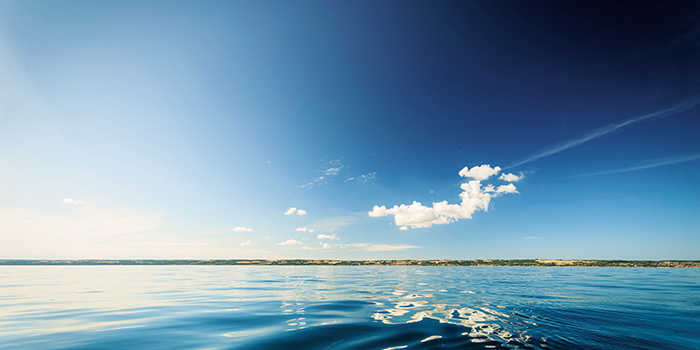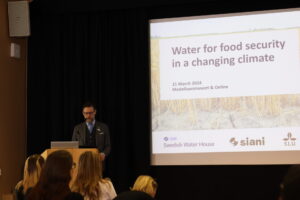Water in the Rio outcomes
SIWI's Karin Lexén has been following the Rio+20 negotiations as an advisor to the Swedish delegation. Her comments as of June 20:

After a preloged negotiation between the 16 and 18 june, the Brazilian government released the Rio + 20 outcome on Tuesday morning and the document was accepted by all parties in a plenary meeting some hours later.
From a water perspective one may do the following observations; It is good that water and sanitation is clearly visible, as the second thematic section in chapter 5 of the outcome document.
It is important that , despite very hard resistance from some countries, there is a paragraph on the human right to safe drinking water and sanitation, even if the languish is diluted and a text got included stating that this right shall be realised “with full respect for national sovereignity” to accommodate some countries that otherwise would not have let the text pass
It is excellent that there are clear references to “the need to adopt measures to significantly reduce water pollution and increase water quality, significantly improve waste water treatment and water efficiency and reduce water losses ” and to ” significantly improve the integrated water resource management AT ALL LEVELS”. The latter is especially important as the paragraph on transboundary water got deleted, where the host country gave it a final shot down by even not including it in the text Brazil presented on Saturday afternoon after taking over the leadership of the negotiations.
Bedsides the loss of the transboundary paragraph, and the weakening of the human rights paragraph another weakness is that there are no words of commitment throughout the text. Also that “nexus sentence” on the linkages between water, food, energy, health, biodiversity and climate, that the EU wanted to have in the chapeau of chapter 5, was not included.
Finally, it is important that the document envisions a process on Sustainable Development Goals, even thought it is a bit unclear how this process will be carried forward and the specific reference to water got lost as the references to thematic issues in the SDG section was deleted”.
Excerpt from the text (20 June) where water is mentioned:
CHAPTER 5, Framework for action and follow-up
A. Thematic areas and cross-sectoral issues
Food security and nutrition and sustainable agriculture
109. We recognize that a significant portion of the world’s poor live in rural areas, and that rural communities play an important role in the economic development of many countries. We emphasize the need to revitalize the agricultural and rural development sectors, notably in developing countries, in an economically, socially and environmentally sustainable manner. We recognize the importance to take the necessary actions to better address the needs of rural communities through, inter alia, enhancing access by agricultural producers, in particular small producers, women, indigenous peoples and people living in vulnerable situations, to credit and other financial services, markets, secure land tenure, health care and social services, education and training, knowledge, and appropriate and affordable technologies, including for efficient irrigation, reuse of treated waste water, water harvesting and storage. We reiterate the importance of empowering rural women as critical agents for enhancing agricultural and rural development and food security and nutrition. We also recognize the importance of traditional sustainable agricultural practices, including traditional seed supply systems, including for many indigenous peoples and local communities.
(…)
111. We reaffirm the necessity to promote, enhance and support more sustainable agriculture, including crops, livestock, forestry, fisheries and aquaculture, that improves food security, eradicates hunger, and is economically viable, while conserving land, water, plant and animal genetic resources, biodiversity and ecosystems, and enhancing resilience to climate change and natural disasters. We also recognize the need to maintain natural ecological processes that support food production systems.
112. We stress the need to enhance sustainable livestock production systems, including through improving pasture land and irrigation schemes in line with national policies, legislation, rules and regulations, enhanced sustainable water management systems, and efforts to eradicate and prevent the spread of animal diseases, recognizing that the livelihoods of farmers including pastoralists and the health of livestock are intertwined.
(…)
Water and sanitation
119. We recognize that water is at the core of sustainable development as it is closely linked to a number of key global challenges. We therefore reiterate the importance of integrating water in sustainable development and underline the critical importance of water and sanitation within the three dimensions of sustainable development.
120. We reaffirm the commitments made in the Johannesburg Plan of Implementation and Millennium Declaration regarding halving by 2015 the proportion of people without access to safe drinking water and basic sanitation and the development of integrated water resource management and water efficiency plans, ensuring sustainable water use. We commit to the progressive realization of access to safe and affordable drinking water and basic sanitation for all, as necessary for poverty eradication and to protect human health, and to significantly improve the implementation of integrated water resource management at all levels as appropriate. In this regard, we reiterate these commitments in particular for developing countries through the mobilization of resources from all sources, capacity building and technology transfer.
121. We reaffirm our commitments regarding the human right to safe drinking water and sanitation, to be progressively realized for our populations with full respect for national sovereignty. We also highlight our commitment to the 2005-2015 International Decade for Action “Water for Life.”
122. We recognize the key role that ecosystems play in maintaining water quantity and quality and support actions within the respective national boundaries to protect and sustainably manage these ecosystems.
123. We underline the need to adopt measures to address floods, droughts, and water scarcity, addressing the balance between water supply and demand including where appropriate non-conventional water resources, and to mobilize financial resources and investment in infrastructure for water and sanitation services, in accordance with national priorities.
124. We stress the need to adopt measures to significantly reduce water pollution and increase water quality, significantly improve wastewater treatment, and water efficiency and reduce water losses. In order to achieve this end we stress the need for international assistance and cooperation.







